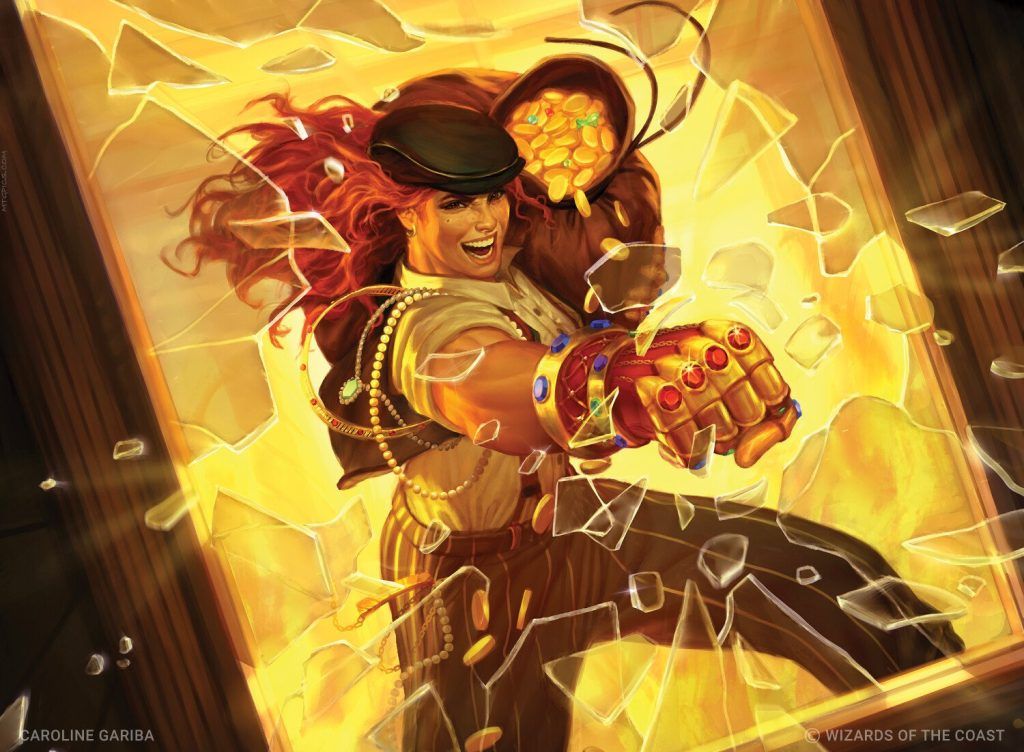Last updated on May 14, 2024

Revel in Riches | Illustration by Eric Deschamps
While Magic has many benefits as a hobby, like growing a community and encouraging critical thinking, nobody could call it cheap. Magic cards can be incredibly expensive. Players jokingly refer to the game as “cardboard crack” and investments in “cardboard stocks” for a reason. I’ve certainly had periods where my waning interest in Magic correlates with lacking the funds to play.
But it’s not all doom and gloom. You can play Magic for little to no money if you make a couple of sacrifices and have a bit of information. I’m going over that information today with options for budget deck-building and playing in paper, digitally, and even Limited and EDH budget tips.
Let’s save some money!
How Do You Save Money on MTG?

All That Glitters | Illustration by Iain McCaig
Most of the money you’ll spend on Magic goes into cards. Accessories like sleeves, playmats, dice, and deck boxes also cost money, but you could get by without them and they don’t always have clean substitutes. I’m focused on playing cheaply by reducing the amount spent on cards.
Card prices follow a simple supply and demand pricing. That’s why random bulk commons from the newest MTG set often cost pennies—few players want Razzle-Dazzler and there’s plenty to go around. This is starkly different than say, Scalding Tarn and the other fetch lands which are:
- In lower supply because they’re rares, and
- In great demand because they’re wildly played in so many formats.
Format staples always cost more than random cards.
So, is the answer just not playing staples? You can go about it like that and some of my tips follow that logic. Another route you can take is buying into Eternal formats like Commander and maintaining one or two decks—for example, a decent EDH deck can likely get by on minor upgrades now and again, rather than constantly investing in new cards the way you would for Standard. This strategy would require an upfront investment now to spend little money in the future.
Another important way to save money is to know what you want from the game. The following tips work best for players with an understanding of what they’re looking for. It might be playing digital Magic cheaply, enjoying casual game nights with friends, or looking to participate in local events. Either way, there’s something for you here.
Online Rental Services
This tip is exclusively for my fellow MTGO players (there are dozens of us!). The client has an in-game economy practically identical to the paper one in form and function, meaning that you can buy and sell cards in MTGO, although the prices between paper and digital marketplaces vary wildly. A Scalding Tarn might cost considerably less on MTGO, but staples still cost more than random commons. Frankly, playing on MTGO could be a budget tip all its own compared to playing in paper, especially in formats like Legacy and Vintage that deal with the Reserved List, but I want to take it a step further by looking at online rental services.
Online rental services in MTGO work just as you’d think; you pay a subscription fee, usually weekly or monthly, and the service gives you an “allowance.” You can request cards up to that limit (typically expressed in tickets, the digital currency of MTGO) and play with them as much as you’d like until you return them.
This is often far more economical than purchasing the cards. Many rental services offer a variety of tiers for your needs. I recommend Cardhoarder’s loan program. You set your ticket limit and it provides a price, making it as flexible as you need it to be. You don’t have to worry about paying more than you need and don’t need to worry about getting scammed since Cardhoarder has been a trusted MTGO store for far longer than loan programs have been around. Digital rental services like this are perfect for players who want to play for some real prizes or are interested in exploring formats with prohibitive price barriers like Legacy and Vintage.
Cockatrice & XMage
Cockatrice and Xmage are open-source online clients for playing Magic digitally. Built and maintained by the community, neither charges a fee for usage. It’s a great place to test new decks and play online, especially with people you might not be able to play with because somebody moved (which is what I use it for).
In addition to keeping connected with friends, you can find new communities. Both clients have Discord servers to generate games around, but you can also find independent servers hosting their game nights on the clients.
Cockatrice has a bit of a learning curve; it’s very bare bones, practically like playing paper Magic digitally with all the pros and cons that come along with it. XMage has a functioning rules engine and even an AI to play against! Both are great digital clients to play on without paying, though you can donate to keep them running.
Using Proxies
Proxying primarily occurs in EDH, though I know plenty of Legacy and Vintage players who don’t mind proxied decks in non-sanctioned events. Proxied decks are among the best ways to play paper Magic cheaply. Proxies cost a fraction of the cost of expensive cards and are perfect for casual play.
You can’t use proxies in sanctioned events like store championships or higher-level events… pretty much nothing with a buy-in or that’s ordained by WotC. But proxies are legal in casual settings, and therefore great for casual game nights with friends where there’s nothing on the line. Playing with proxies offers benefits beyond cost; you can easily customize them to show off your style and the accessibility makes it easy to try out new strategies that might be outside your comfort zone.
You can find all kinds of proxies and proxy services; Draftsim has plenty of guides on the best proxy services you can refer to. To keep it brief, I want to shout out Printing Proxies and MTG Proxy as two sites with simple UIs and great prices to start your proxy journey.
Budget Mana Bases
Let’s say you aren’t interested in proxies or digital play and want to make your physical deck of real Magic cards cheaper. The first place to look is the mana base. The best lands in MTG, like untapped dual lands or dual lands with land types (let alone the original dual lands from Alpha) are practically always multiformat staples and printed at rare, which is a terrible double-whammy for price. It’s not uncommon to see most of a deck’s price in the mana base, especially in formats with fetches and shock lands.
Building a budget mana base isn’t particularly hard, but it impacts your deck’s power level. Budget dual lands often come into play tapped. Tapped lands effectively put you a turn behind when played; this might not matter much on turn 1 or 2, especially in a format like Commander, but it adds up.
You could always increase the number of basic lands in your deck to get untapped lands, but then you decrease the deck’s consistency. 2-color decks can get away with a bunch of basics, but three or more colors really need the mana fixing provided by dual lands.
So, what can you do? Firstly, restricting the number of colors helps a ton. If you only play one or two colors, you can get away with a bunch of basics for a cheaper mana base. If you really want to play three or more colors, you’ll need to content yourself with a bunch of tapped lands. If you do so, avoid aggressive strategies; they need to spend all their mana on the opening turns. Decks playing for the long game can often afford more tapped lands, especially if you use board wipes to make up for falling behind early.
Playing Pauper Formats
Pauper formats only use common cards. The most, er, common one is Pauper, a sanctioned format of commons-only that started on MTGO and gained popularity for its engaging gameplay many have called “Legacy-lite.” Like any format, it has its expensive staples—especially on MTGO with the messy distribution of cards from supplementary sets like Conspiracy—but top-tier Pauper decks rarely cost more than $100. A steal considering the multi-hundreds of dollars needed to buy into most other formats and Commander precon deck prices creeping higher.
Pauper formats aren’t relegated to 60-card Constructed. EDH has two Pauper options: True Pauper EDH (pDH) and the smaller Artisan EDH. Pauper EDH restricts all cards in the 99 to common, allows any uncommon creature to be your commander, and has a unique ban list. Artisan EDH restricts legality to cards printed at common and uncommon, retaining the same ban list and rules as regular Commander.
Each format has their charms, but both share a common theme: Restricting card legality brings the price down. Cheaper card prices aren’t the goal of the formats but a lovely bonus. Most expensive cards are rares and mythics; cutting them slashes deck budgets considerably. In addition to being great budget formats, these two formats give brewers who dislike power creep and for-Commander cards an outlet to play the game while avoiding egregious designs.
Buying Precons
Buying prebuilt decks sets a hard limit on the amount you’ll spend. The vast majority of preconstructed decks on the market are for EDH, though some digging can turn up old starter decks and planeswalker decks (which tend to be very bad).
Precon prices vary. While they release at a flat rate, it doesn’t take long for prices to change according to the value of cards within the deck when purchasing through an LGS or similar store. Big box stores like Walmart and Target don’t increase prices based on the contents, but their decks go fast because players in the know snap them up. Universes Beyond releases have also cost more than precons accompanying Standard expansions.
EDH precons tend to be relatively weak. Recent sets have made good progress on making them more streamlined and playable out of the box, but the average Commander precon is still weaker than the average EDH deck at your LGS, even casual ones. Precons play best when played against other precons. I don’t say this to warn you off purchasing them, just so you know what to expect at the LGS.
Because precons play well with each other, a playgroup could purchase a handful to get in on the game cheaply. Everybody playing precons would help keep the group at a stable power level as well. If the power of a precon doesn’t suit your needs, you can easily upgrade them bit by bit, using the deck as a solid foundation to build upon while having the bulk of your cards on hand.
Buy Singles, not Packs
If you want specific cards, you should always, always, always buy singles instead of packs. There are two situations in which buying booster packs makes good sense for the average player: playing Limited or opening them for fun.
Trying to open booster packs to get specific cards is a losing game, especially when chasing a rare or mythic. Purchasing packs is a temptation too many players fall into. It’s easy to look at a $30 rare and think you can pull it by purchasing five or six packs but the odds are very much not in your favor. At that point you’d be better off organizing a Sealed or Draft night with your packs.
If you want to play Limited or just enjoy the surprise aspect of opening packs, go for it! I don’t want to dissuade you from ever cracking a pack. But be mindful of what you want out of it and don’t stake your cash on a narrow gamble.
Build a Cube
This tip is a little different than the others. It goes out to my fellow Limited players who want to participate in the format but don’t want to enter events over and over. Purchasing a Cube can be more of an investment than other options on this list. The payoff comes from having a “set” you can draft whenever you get a couple buddies together.
Building a Cube can look financially daunting, especially if you’re only familiar with Vintage and other powered Cubes. But there are plenty of ways to build Pauper Cubes and Peasant Cubes that only use commons and uncommons, which are cheap to assemble and maintain. You can also proxy a Cube just like a Commander deck. Larger Cubes take up a lot of storage space and require forethought for transportation, but overall they can provide Limited players with a means of playing the game that doesn’t require a constant influx of cash for entry fees.
Wrap Up

Jolene, the Plunder Queen | Illustration by Caroline Gariba
Though Magic can be a very fulfilling hobby on account of personal relationships and gameplay, it does anything but fill your wallet. These tips are for players deeply in love with the game and looking for ways to navigate the high price barriers that can drive them away. Whether you want to play Limited, EDH, or enter high-stakes events, there’s something for everybody here.
What are your best budget tips for Magic? How do you save money on the game? Let me know in the comments below or on the Draftsim Discord!
Stay safe, and thanks for reading!
Follow Draftsim for awesome articles and set updates:

Add Comment